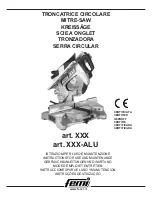
7
ENGLISH
5.
To check lower guard, open lower guard by
hand, then release and watch guard closure.
Also check to see that retracting handle does
not touch tool housing.
Leaving blade exposed
is VERY DANGEROUS and can lead to serious
personal injury.
Additional safety warnings
1.
Use extra caution when cutting damp wood,
pressure treated lumber, or wood containing
knots.
Maintain smooth advancement of tool with-
out decrease in blade speed to avoid overheating
the blade tips.
2.
Do not attempt to remove cut material when
blade is moving. Wait until blade stops before
grasping cut material.
Blades coast after turn off.
3.
Avoid cutting nails. Inspect for and remove all
nails from lumber before cutting.
4.
Place the wider portion of the saw base on
that part of the workpiece which is solidly
supported, not on the section that will fall off
when the cut is made. If the workpiece is short
or small, clamp it down. DO NOT TRY TO HOLD
SHORT PIECES BY HAND!
►
Fig.5
5.
Before setting the tool down after completing a
cut, be sure that the guard has closed and the
blade has come to a complete stop.
6.
Never attempt to saw with the circular saw
held upside down in a vise. This is extremely
dangerous and can lead to serious accidents.
►
Fig.6
7.
Some material contains chemicals which may
be toxic. Take caution to prevent dust inhala-
tion and skin contact. Follow material supplier
safety data.
8.
Do not stop the blades by lateral pressure on
the saw blade.
9.
Do not use any abrasive wheels.
10.
Only use the saw blade with the diameter that
is marked on the tool or specified in the man
-
ual.
Use of an incorrectly sized blade may affect
the proper guarding of the blade or guard opera
-
tion which could result in serious personal injury.
11.
Keep blade sharp and clean.
Gum and wood
pitch hardened on blades slows saw and
increases potential for kickback. Keep blade clean
by first removing it from tool, then cleaning it with
gum and pitch remover, hot water or kerosene.
Never use gasoline.
12.
Wear a dust mask and hearing protection when
use the tool.
SAVE THESE INSTRUCTIONS.
WARNING:
DO NOT let comfort or familiarity
with product (gained from repeated use) replace
strict adherence to safety rules for the subject
product. MISUSE or failure to follow the safety
rules stated in this instruction manual may cause
serious personal injury.
Important safety instructions for
battery cartridge
1.
Before using battery cartridge, read all instruc-
tions and cautionary markings on (1) battery
charger, (2) battery, and (3) product using
battery.
2.
Do not disassemble battery cartridge.
3.
If operating time has become excessively
shorter, stop operating immediately. It may
result in a risk of overheating, possible burns
and even an explosion.
4.
If electrolyte gets into your eyes, rinse them
out with clear water and seek medical atten-
tion right away. It may result in loss of your
eyesight.
5.
Do not short the battery cartridge:
(1)
Do not touch the terminals with any con-
ductive material.
(2)
Avoid storing battery cartridge in a con-
tainer with other metal objects such as
nails, coins, etc.
(3)
Do not expose battery cartridge to water
or rain.
A battery short can cause a large current
flow, overheating, possible burns and even a
breakdown.
6.
Do not store the tool and battery cartridge in
locations where the temperature may reach or
exceed 50 °C (122 °F).
7.
Do not incinerate the battery cartridge even if
it is severely damaged or is completely worn
out. The battery cartridge can explode in a fire.
8.
Be careful not to drop or strike battery.
9.
Do not use a damaged battery.
10.
Follow your local regulations relating to dis-
posal of battery.
SAVE THESE INSTRUCTIONS.
CAUTION:
Only use genuine Makita batteries.
Use of non-genuine Makita batteries, or batteries that
have been altered, may result in the battery bursting
causing fires, personal injury and damage. It will
also void the Makita warranty for the Makita tool and
charger.
Tips for maintaining maximum
battery life
1.
Charge the battery cartridge before completely
discharged. Always stop tool operation and
charge the battery cartridge when you notice
less tool power.
2.
Never recharge a fully charged battery car-
tridge. Overcharging shortens the battery
service life.
3.
Charge the battery cartridge with room tem-
perature at 10 °C - 40 °C (50 °F - 104 °F). Let
a hot battery cartridge cool down before
charging it.








































